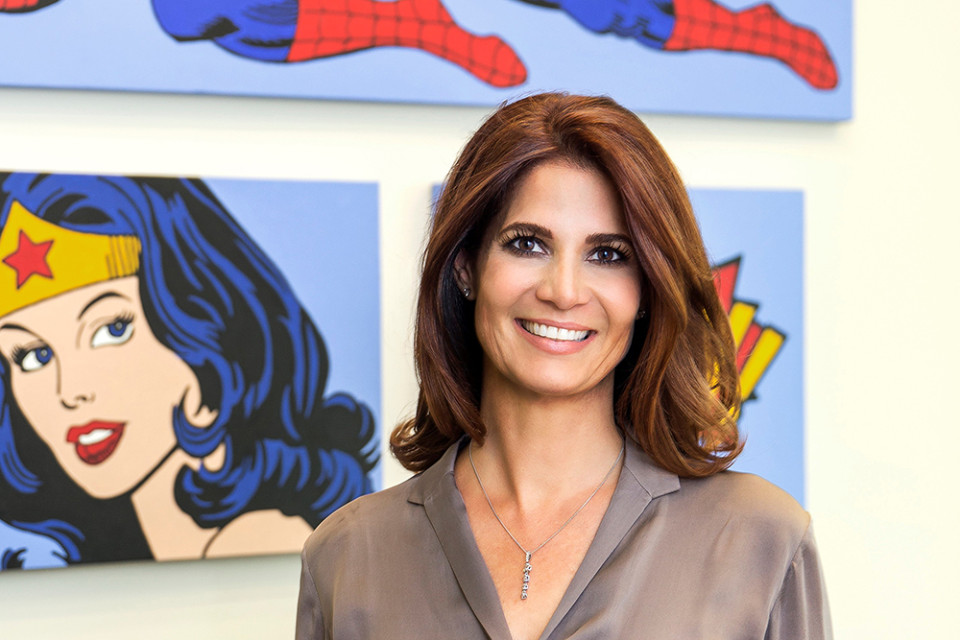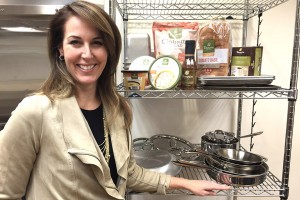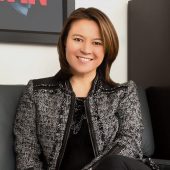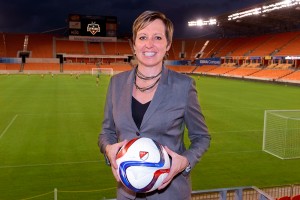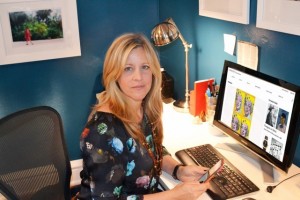Jenny Dearborn, Stanford Graduate and Chief Learning Officer & SVP at Global Technology Company SAP
Jenny Dearborn is the Chief Learning Officer and Senior Vice President at SAP, the global “enterprise application software” tech company in Palo Alto. She is a California native, and a graduate of Stanford and UC Berkeley; however, despite such high-powered credentials, she readily admits that her early educational experience was rife with misdiagnosed disorders that led to her being labeled with learning disabilities. That experience fueled her interest in education and a wish to see that whenever possible, other students would not go thru the same ordeal. After being a high-school teacher, she transitioned into corporate education, where the focus was very tech-driven, leading to her current role at SAP.
She is the author of Data Driven: How Performance Analytics Delivers Extraordinary Sales Results, and a wife and mother — though not, as she emphatically points out, a cook! Despite this, her nourishing daily meals of blueberries and oatmeal breakfast, plus spinach salad with egg lunch, help to get her through days that can start anywhere from 4 a.m. to 7 a.m., and include numerous meetings, many of them on the phone, as she notes. Her other duties include skip-level meetings, and those with internal stakeholders, or brainstorming projects. She is also the executive producer of the radio show on VoiceAmerica called “Game Changing Women.” Read below for more about her busy schedule and thoughts on helping other women in the workplace, a particular focus of hers.
Can you tell the readers a little bit about yourself?
-
-
- I am crazy in love with my family – I am a mom, wife, sister, and daughter.
- I am passionate about helping others – I have many social causes that I support: gender pay equality, advancing women in the workplace, STEM education, rights of the disabled, and LGBT rights, to name a few.
- I am committed to advancing my profession; I am a high-performing practitioner, researcher, thought leader, writer, teacher and student. I love my work.
-
What does a day in your shoes typically look like?
In a typical day (when I’m not traveling), there are lots of different things going on.
-
-
- 5-7 a.m.: Phone calls in my home office with clients in Europe — multitasking and getting dressed while on the phone!
- 7-8 a.m.: Wake my kids up, make them breakfast and pack their lunches, and send them off to school on their bikes.
- 8-3 p.m.: In the office, having 1x1s with the staff; skip-level meetings with extended staff; meetings with internal stakeholders; project meetings; giving presentations to external customers; reading, thinking and writing; and hosting events. (Most meetings are on the phone vs. in-person meetings.)
- 3-4 p.m.: Workout at the gym that is halfway between my office and home.
- 4-9 p.m.: Hang out with my family, put dinner on the table, help with homework, get kids ready for bed, etc.
- 9-11 p.m.: Get back online and finish up email, presentations, prep for my day tomorrow, etc.
-
What are the first three things you do when you wake up in the morning and the last three things you do before you go to bed?
Morning: 1) Find my glasses and check my phone for urgent issues that may have come in overnight from other time zones, 2) check on my kids, and 3) let my dog out and give her breakfast.
Night: 1) Check what time my first meeting is in the morning and set my alarm for anywhere between 4 and 7 a.m., 2) check on my kids in their beds, and 3) put my dog to bed.
What is your breakfast of choice?
I’m not a foodie at all. To me, food is just fuel. I eat the same thing for breakfast on most days: oatmeal with blueberries, plus maybe a scrambled egg if my husband is making them.
What and who inspires your work?
I am an activist. I am inspired by people who are powerless and need support. Sometimes I’ve overwhelmed by how much I want to give of myself, and need to focus and prioritize so I can continue to be effective.
What keeps you energized and motivated at work?
The people I work with – I’ll start with my team, whom I adore. They are hands-down the best professionals I’ve ever worked with in my career. My peers are awesome, and I’m fortunate to work with a leadership team who are truly visionary. My internal customers and clients are smart, engaged, innovative and so appreciative of the work my team and I do.
What is the favorite part of your job?
I love the variety of my role. SAP encourages leaders to take every opportunity to make a difference, so I’ve been able to impact a wide range of social issues in addition to my role of executing our global learning strategy. I enjoy teaching our management and leadership courses to executives, teaching personal branding to groups of female new hires, and being SAP’s global executive sponsor of both our LGBT employee affinity group and our Business Women’s Network group. It’s all challenging and rewarding — but the best part is simply the variety and constant changing nature of the work I do!
What has been your biggest obstacle in your career, and how did you overcome it?
I am severely Dyslexic, have ADHD (Attention Deficit Hyperactivity Disorder) and mild OCD (Obsessive Compulsive Disorder), but I was undiagnosed until age 18. In college I learned coping skills and how to see the positives of my disabilities. I continue to use these coping skills every day.
How many times have you changed your career direction?
Five times, but I’m not sure they all count. When I was 10 I wanted to be a professional skateboarder, in my teens I wanted to be an actress and a fashion model, at some point I thought I wanted to be an international spy, studied Russian and learned to shoot at a firing range, then I wanted to be a high school teacher, then a career in corporate learning. And I’m not done – I have a few more changes to go.
Three questions you like to ask during an interview to know if the candidate (or job) is the right fit?
-
-
- Tell me about the best day you ever had at work. What were you doing?
- Tell me about the worst day you ever had at work. What were you doing?
- Tell me about a time when you were really wronged at work. What happened?
- Now tell me that story again, but explain how it was all your fault.
-
What are the most important qualities of a good leader?
Great leaders inspire a common purpose, collaboratively create a shared vision and translate that vision into reality. Leadership is about action and seeing solutions where others only see challenges and obstacles. Great leaders know that people want to “make a dent in the universe,” as Steve Jobs once said, and make the world a better place, and that comes through empowering others to achieve their greatest potential.
Leadership is also about the courage to stand alone. Peter Drucker said that “Leadership is lifting a person’s vision to high sights, the raising of a person’s performance to a higher standard, the building of a personality beyond its normal limitations.” That really speaks to me, and I know that one of the most important things I do as a leader is to inspire and support my team to realize their potential and to build fulfilling careers.
What is your favorite leisure activity after a stressful work week?
I don’t believe in stress as a negative factor in my life. Often work and life are demanding and challenging, but you can use this energy as fuel to drive you where you need to go. Exercise is the best way to harness potential stressful energy to use as personal power. I try to exercise hard every day to prevent having a stressful work week.
At the end of a long and challenging work week, I like to do something low-key with my family – play cards or a board game; take our dog on a walk; watch a Giants baseball game on TV; go out to dinner; exercise as a family (go the pool to swim laps or go on a bike ride); or just hang out and talk.
What advantages do you see as a woman in the workplace?
My friend, Toni Burke (Director of City Year in Silicon Valley) was super-smart at a young age, and it was clear to her dad she was going to be very successful. Her dad used to say, “It’s a good thing you’re a girl — they’ll never see you coming!” I remember this when I think of amazing women in the workplace. Every company worth working for knows it has a gender diversity issue, especially in their executive ranks. So women who are super-smart and capable should write their own ticket at the company of their choice. Being a smart and capable woman, you have doors open to you, so walk through them.
What advice would you give women starting their career?
“You don’t get in life what you deserve, you get what you negotiate.” Figure out what you truly want, go for it, and don’t settle. Don’t wait, do it now!
You’re very active in supporting women and leaders — what are some of the key issues you see with young professionals?
I think young women professionals today are amazing. I’ve just been blown away by how poised, thoughtful, articulate, competent and hard-working all the early talent and college hires are that I’ve met. I don’t see any “issues” — as in problems or challenges — with young professionals.
But I do go out of my way to remind young professionals that they are the majority – the largest generation in world history. By 2020, 50% of the global working population will be millennials, by 2025, 75% of the global working population will be millennials. I remind them to use their strength in numbers – critical mass – for good; make the world a better place. Organize, collaborate, invent, vote, participate, engage, roll up their sleeves, drive change… and lead!
How do you think the tech industry has evolved over the past few years to better support women in tech?
I’d like to say that the tech industry is a pure meritocracy, that the best idea always wins, that tech is color-blind and gender-neutral. But that would be a lie. Tech is better than it was in the past and it gets better every day, but still other industries have better track records for diversity and inclusion.
But given this, tech has come to a great awareness in the past few years about this disparity, and is actively making strides to close the gap. Some companies are vowing to review the compensation of all female employees and correct any pay inequality they uncover; some have very effective female leadership development programs; and some have great track records of promoting and supporting women.
So do your homework into the culture and diversity metrics of a company and see if it’s a place you want to work. Remember, you are interviewing them. You don’t need them, they need you. Don’t bring your talent to a company that doesn’t deserve you.
What book would you recommend for women just starting their career?
I recommend these classics to any young professional starting out his/her career: The First 90 Days by Michael Watkins, What Got You Here, Won’t Get You There by Marshall Goldsmith, and Good to Great by Jim Collins.
TAGS: SharpSavvySignificant
 Effective Communication
Effective Communication Women Making History
Women Making History Grants & Funding Sources
Grants & Funding Sources Interview Prep
Interview Prep Impactful Leadership
Impactful Leadership Dressing for Work
Dressing for Work Dressing for Your Style
Dressing for Your Style Interview Style Tips
Interview Style Tips Women's Stocking Stuffers
Women's Stocking Stuffers Gift the Busy Traveler
Gift the Busy Traveler Airport Layover Activities
Airport Layover Activities Traveling & Eating Healthy
Traveling & Eating Healthy Travel Like a Boss Lady
Travel Like a Boss Lady The Dual California Life
The Dual California Life Gifts for Thanksgiving
Gifts for Thanksgiving Summer Reading List
Summer Reading List Top Leisurely Reads
Top Leisurely Reads New Year, New Books
New Year, New Books Life Lessons from a Sitcom
Life Lessons from a Sitcom Oprah, Amy or Amal?
Oprah, Amy or Amal?





